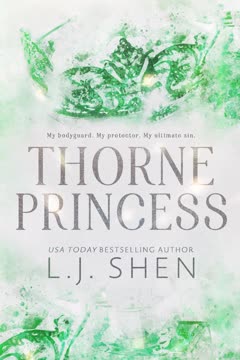Plot Summary
Nightmares Become Reality
Gia Bennett's life is upended when her boss, Tatum Blackthorn, the man who haunts her nightmares, discovers her vulnerability—her ailing mother. Tate, cold and calculating, offers Gia a deal she cannot refuse: her mother's life in exchange for Gia's own. The lines between nightmare and reality blur as Gia is forced to confront the darkness she's always feared, now embodied in the man who controls her fate. The emotional tension is palpable, as Gia's desperation collides with Tate's obsession, setting the stage for a twisted relationship where power, fear, and desire become inseparable.
The Devil's Bargain
Gia's world narrows to a single, impossible choice: save her mother or save herself. Tate proposes marriage—not for love, but as a transaction. Gia's compliance is the price for her mother's access to an experimental treatment. The arrangement is cold, clinical, and laced with Tate's sadistic pleasure in her discomfort. Yet, beneath the surface, both are drawn to the fire of their mutual antagonism. Gia's resolve is tested as she realizes that the devil's bargain is not just about survival, but about surrendering to a man who wants to own her completely.
A Marriage of Enemies
Gia and Tate's marriage is a battlefield. Their wedding is a spectacle of indifference and humiliation, with Gia forced to play the role of the dutiful wife while Tate continues his campaign of psychological warfare. Theirs is a union forged in resentment, but also in a strange, undeniable chemistry. Gia's independence clashes with Tate's need for control, and every interaction is a test of wills. As they navigate the treacherous waters of their new life together, the boundaries between hate and desire begin to erode, leaving both vulnerable in ways they never expected.
Haunted by the Past
Both Gia and Tate are haunted by their histories—Gia by the loss of her family and the burden of caring for her mother, Tate by a childhood marked by abuse and the violent death of his adoptive father. Their traumas shape their every move, fueling their mistrust and their need to hurt before being hurt. Tate's rituals and compulsions reveal a mind at war with itself, while Gia's grief threatens to consume her. In the shadows of their shared home, secrets fester, and the past refuses to stay buried, threatening to destroy any hope of peace.
The Price of Protection
As Tate's quest for vengeance against his father's killers entangles him with the Mafia, Gia becomes collateral damage. Threats from rival crime families force Tate to tighten his grip, surrounding Gia with bodyguards and stripping away her last vestiges of freedom. Gia's resentment grows, but so does her understanding of the darkness that drives Tate. When violence erupts and Gia is nearly kidnapped, the stakes become terrifyingly real. Their survival depends on a fragile trust, and the realization that, in this world, love and protection come at a steep price.
Lines Crossed, Hearts Exposed
The tension between Gia and Tate explodes into passion, shattering the barriers they've built. Their physical connection is raw, desperate, and laced with the pain of their pasts. For the first time, they allow themselves to be vulnerable, exposing wounds that have never healed. Tate's obsessive need for control is matched by Gia's fierce independence, creating a volatile mix of tenderness and cruelty. In the darkness, they find a twisted kind of solace, but the lines between love and hate, pleasure and pain, are more blurred than ever.
Blood and Vengeance
Tate's vendetta against his father's murderers spirals into a full-blown Mafia war, dragging Gia deeper into a world of violence and retribution. Each act of vengeance brings new enemies and greater danger, forcing Gia to confront the reality of the man she married. As bodies fall and alliances shift, Gia must decide how far she's willing to go to protect herself—and whether Tate's darkness is something she can live with. The cost of revenge is steep, and both are forced to reckon with the blood on their hands.
Secrets and Confessions
The weight of secrets becomes unbearable. Gia confesses her own role in the tragedy that shaped Tate's life, revealing that she, too, is complicit in the cycle of violence. Tate, in turn, exposes the depth of his trauma and the compulsions that rule him. Their confessions are both a reckoning and a release, breaking the last barriers between them. But trust, once broken, is hard to rebuild. Both must confront the reality of who they are—and whether forgiveness is possible in a world built on betrayal.
The Breaking Point
Gia's mother's death is the final blow, leaving her adrift and untethered. Grief consumes her, and Tate's inability to offer comfort threatens to destroy what little remains of their fragile bond. Both are forced to confront the emptiness at the heart of their lives, and the realization that survival is not the same as living. In the aftermath of loss, they must choose whether to cling to the ruins of their marriage or risk everything for a chance at something real.
Love in the Darkness
In the depths of despair, Gia and Tate find each other—not as enemies, but as partners in pain. Therapy, honesty, and the slow work of rebuilding trust become their salvation. Tate confronts his mental health, seeking help for the first time, while Gia learns to let go of her need to control everything. Together, they discover that love is not the absence of darkness, but the willingness to face it together. Their relationship, once built on power and fear, becomes a sanctuary where both can finally be seen and accepted.
The Cost of Survival
The journey to healing is neither easy nor linear. Gia and Tate must sacrifice old identities and patterns, learning to prioritize each other over pride and vengeance. The world around them remains dangerous, but they carve out a space of safety and hope. Gia's decision to move back to England marks a turning point, offering both a chance to start anew. The cost of survival is high, but the reward is a love forged in fire—imperfect, but enduring.
A War for Peace
The final confrontation with the Mafia brings closure, but not without loss. Tate must choose between revenge and the future he wants with Gia, ultimately sacrificing his need for retribution to protect the woman he loves. Peace comes not through victory, but through surrender—of old grudges, of the need to control, of the belief that love is weakness. In choosing each other, Gia and Tate find the strength to build a life beyond violence.
Loss and Letting Go
The aftermath of Gia's mother's death is a time of mourning, but also of renewal. Surrounded by friends and the family they've chosen, Gia and Tate learn to honor the past without being bound by it. The pain of loss becomes a foundation for growth, and the scars they carry are transformed into symbols of survival. In letting go, they make room for new beginnings and the possibility of happiness.
Redemption and Ruin
Redemption is not found in grand gestures, but in the daily work of loving and being loved. Tate's journey through therapy and self-discovery allows him to accept his flaws and embrace vulnerability. Gia, too, learns to forgive herself and trust in the future. Together, they create a life that is messy, complicated, and real—a testament to the power of forgiveness and the resilience of the human heart.
A New Beginning
In the quiet of their new life in England, Gia and Tate find peace. The ghosts of their pasts no longer haunt them, and the future is bright with promise. Parenthood, friendship, and the simple joys of daily life become their new reality. Their love, once forged in darkness, now shines with the warmth of hope. The story ends not with a grand triumph, but with the quiet certainty that, together, they can face anything—and that, sometimes, the greatest victory is simply surviving, and loving, against all odds.
Characters
Gia Bennett
Gia is a woman forged by loss and responsibility, having lost her father and brother in a tragic accident and caring for her mother through the ravages of dementia. Her strength lies in her ability to endure, to adapt, and to fight for those she loves—even when it means sacrificing her own happiness. Gia's relationship with Tate is a crucible, forcing her to confront her own darkness and capacity for forgiveness. She is fiercely independent, yet deeply vulnerable, and her journey is one of learning to accept love, to let go of guilt, and to choose herself without abandoning those who depend on her. Her evolution from victim to partner is the emotional core of the novel.
Tatum "Tate" Blackthorn / Gabriel Doe
Tate is a man shaped by trauma: a childhood of abuse, the murder of his adoptive father, and a lifetime of isolation. His brilliance is matched only by his ruthlessness, and his obsessive-compulsive disorder manifests in rituals and a need for control. Tate's fixation on Gia is both a punishment and a plea for connection—he wants to own her, but also to be saved by her. His journey is one of painful self-awareness, as he confronts his mental illness, his capacity for violence, and his desperate need for love. Through therapy and Gia's unwavering presence, Tate learns that vulnerability is not weakness, and that redemption is possible even for those who believe themselves beyond saving.
Telma Bennett
Telma's decline into dementia is the catalyst for much of Gia's sacrifice and suffering. Her presence haunts the narrative, representing both the pain of losing a loved one and the enduring power of memory and love. Telma's eventual passing is a moment of profound grief, but also of release, allowing Gia to finally begin healing. Her spirit, wisdom, and warmth linger, shaping Gia's choices and offering a reminder that love endures beyond death.
Enzo Ferrante
Enzo is a member of the Ferrante crime family, tasked with protecting Gia during the height of the Mafia war. Beneath his bravado and dark humor lies a man who understands the cost of violence and the burden of loyalty. Enzo's interactions with Gia reveal his empathy and his own struggles with the world he inhabits. He serves as both protector and confidant, offering moments of levity and insight amid the chaos.
Achilles Ferrante
Achilles is the embodiment of the Mafia's brutality—a man who relishes violence and power. His relationship with Tate is one of mutual respect and rivalry, and his actions drive much of the external conflict. Achilles is both a threat and an ally, his unpredictability keeping everyone on edge. He represents the dangers of a world where loyalty is conditional and violence is currency.
Tiernan Callaghan
Tiernan is the head of the rival Irish Mafia, a man as cunning as he is dangerous. His vendetta against Tate and willingness to use Gia as leverage escalate the stakes, forcing both protagonists to confront the limits of their power and the depth of their commitment to each other. Tiernan's presence is a constant reminder that the past cannot be outrun, and that peace often comes at a price.
Row Casablancas
Row is one of Tate's few genuine friends, offering a counterpoint to Tate's darkness with his own brand of loyalty and humor. His relationship with Gia is one of mutual respect, and his willingness to challenge Tate provides moments of clarity and growth. Row's presence grounds the narrative, reminding both Gia and Tate of the importance of chosen family.
Calla Casablancas
Calla is Gia's closest friend, offering unwavering support through every trial. Her warmth, humor, and honesty provide a safe haven for Gia, and her own experiences with trauma and healing mirror Gia's journey. Calla's friendship is a lifeline, reminding Gia that she is not alone and that love can be found in many forms.
Dylan Litvin
Dylan brings levity and strength to the story, her irreverence and loyalty helping Gia navigate the darkest moments. She is unafraid to challenge both Gia and Tate, pushing them toward honesty and self-acceptance. Dylan's presence is a testament to the power of friendship and the importance of laughter in the face of pain.
Dr. Arjun Patel
Dr. Patel is the voice of reason and hope, guiding Tate through the labyrinth of his mental illness. His patience, insight, and refusal to give up on Tate are instrumental in the latter's journey toward self-acceptance and recovery. Dr. Patel represents the possibility of change, the importance of seeking help, and the belief that even the most damaged souls can find peace.
Plot Devices
Enemies-to-Lovers Marriage of Convenience
The central device is the marriage of convenience between Gia and Tate, born out of desperation and necessity rather than love. This arrangement forces two damaged, distrustful people into close quarters, stripping away their defenses and exposing their vulnerabilities. The enemies-to-lovers arc is heightened by the constant push and pull of power, desire, and resentment, creating a dynamic where love is both a weapon and a salvation. The marriage is not just a plot device, but a crucible in which both characters are remade.
Dual Narration and Psychological Depth
The story alternates between Gia's and Tate's points of view, offering insight into their inner worlds and the traumas that shape them. This dual narration allows for a nuanced exploration of mental illness, grief, and the complexities of love. The psychological depth is further enhanced by the use of rituals, compulsions, and therapy, grounding the narrative in the realities of healing and self-discovery.
Mafia War and External Threats
The ongoing Mafia war provides external stakes that mirror the internal battles of the protagonists. The threats from rival families, the constant danger, and the need for protection force Gia and Tate to confront their own limits and the consequences of their choices. The violence is not gratuitous, but serves to heighten the emotional stakes and underscore the cost of survival in a world where trust is rare and betrayal is deadly.
Secrets, Confessions, and Redemption
The gradual revelation of secrets—Gia's role in Tate's past, Tate's mental illness, the true nature of their traumas—serves as both a source of conflict and a path to redemption. Confession becomes an act of vulnerability, and forgiveness is hard-won. The narrative structure uses these revelations to build tension, deepen character development, and ultimately offer hope for healing.
Symbolism and Motifs
The recurring motif of the seashell bracelet, the use of Alice's Adventures in Wonderland, and the rituals of numbers and routines serve as symbols of hope, memory, and the struggle for control. These objects and habits ground the characters, offering comfort in chaos and serving as touchstones for their journeys.
Analysis
"Handsome Devil" is a dark, emotionally charged exploration of trauma, love, and redemption set against the backdrop of organized crime. At its core, the novel interrogates the ways in which pain and loss shape identity, and how the quest for control—over oneself, over others, over fate—can both protect and destroy. Through the lens of an enemies-to-lovers marriage, L.J. Shen examines the limits of forgiveness, the necessity of vulnerability, and the possibility of healing even for those who believe themselves irreparably broken. The story's modern relevance lies in its unflinching portrayal of mental illness, the complexities of caregiving, and the power dynamics inherent in relationships. It challenges the notion that love is a panacea, instead suggesting that true connection requires honesty, sacrifice, and the willingness to confront one's own darkness. Ultimately, "Handsome Devil" is a testament to the resilience of the human spirit, the transformative power of chosen family, and the hope that, even in the bleakest circumstances, love can be both a refuge and a revolution.
Last updated:
Review Summary
Handsome Devil by L.J. Shen is a dark, mafia-themed romance that has received mostly positive reviews. Readers praise the intense chemistry between the main characters, Tate and Gia, and the compelling plot filled with twists and suspense. Many consider it Shen's darkest work yet, with complex characters and emotional depth. While some found it too extreme, others appreciated the exploration of mental health issues and the author's signature writing style. The book is noted for its spicy scenes, witty banter, and satisfying conclusion to the Forbidden Love series.
Download PDF
Download EPUB
.epub digital book format is ideal for reading ebooks on phones, tablets, and e-readers.









